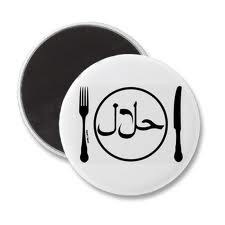Naumaan Farooq, Asian Express
 Machine slaughter of animals for halal consumption has been unanimously rejected by 40 of the country’s top Islamic scholars a UK conference has heard.
Machine slaughter of animals for halal consumption has been unanimously rejected by 40 of the country’s top Islamic scholars a UK conference has heard.
The debate which took place at the Hijaz Centre, Nuneaton was attended by some of the country’s most respected Imams who passed a vote on whether machine slaughter of animals for halal consumption is strictly permitted under Islamic law or not.
Halal is an Arabic term meaning permissible in Islam.
One of the scholars speaking at the event, said: “Mass machine slaughter of animals is totally not allowed in Islam.
“The prescribed holy words should be said upon every animal and not just once.
“What’s more is, it can’t be one person just flicking a switch which kills a mass number of animals by rotary blade. It needs to be on an individual basis.
“Some people say during machine slaughter, just the first chicken is halal, but what’s for sure is that the majority are not.”
There are around 3.5 million Muslims living in the UK – about three per cent of the population.
They account for about 25 per cent of lamb/sheep consumption in this country and 30 per cent of poultry consumption.
The halal meat/poultry market therefore is a multi-billion pound contributor to the British economy.
The latest figure issued by Food Standard Agency carried out a survey for one week from September 19th to 25th 2011.
They carried out checks in every slaughterhouse whilst slaughtering was being undertaken.
A total of 16,101,844 poultry were slaughtered at 73 establishments, of which 4,766,237 were slaughtered halal at 29 establishments.
Of this number 3,523,313 were slaughtered halal by automation by a rotary blade (machine slaughtered) and 1,242,924 were slaughtered halal manually (hand slaughtered).
With over 3.5 million poultry being slaughtered halal by machines, this method could now be stopped.
A spokesman from Trading Standards said they would be looking into this matter following the decision.
Chief Executive of Cappoquin, one of the UK’s biggest halal meat slaughter houses was at the meeting over the weekend.
He said: “The decision that was reached is a good beginning but it’s not the end of it. There’re a lot of other things that we need to address.
“The issue of machine slaughter is something that really needs to be looked at.
“Although what I would advise people to do is go down and see for themselves at slaughter houses across the country to experience what goes on, both the right and wrong way to do it .
“But these are all steps in the right direction.”
Naved Syed, Member of Eblex Halal Steering Group and responsible for organising Sunday’s Halal Authority Board event, said: “We need to resolve this matter, this can only be resolved by our religious authorities, as they are custodian of our religion and have no vested interest in the commercial industry, the question is to do with Religion, legitimacy and not commercialism.”
The guidance note on halal food issues, as issued by Sarah Appleby, Head of Enforcement and Local Authority Delivery Division, reads: “The mislabelling and misrepresentation of halal foods is of real importance to the Muslim community, and continues to be an issue of concern.
“For this reason we are re-issuing the advice drawn up in association with relevant Muslim organisations, LGR and Defra, Food enforcement officers are requested to: Use this advice when planning inspections, food sampling and labelling checks relating to halal foods.”
However, on the issue of machine slaughter the Halal Food Authority (HFA) have said it is permissible under Islamic law despite widespread objection.
Masood Khawaja president of the Halal Food Authority, said: “Yes it is frowned upon in some circles but we think it’s fine as long as three main criteria are upheld and they are, the animal is not dead before slaughtered, the blood is drained out and that no other name other than Allah’s (God’s) is said over the animal before its death.
“The Quran doesn’t say anything about mechanisms; all these machines were invented only recently.
“Everything is done according to science and technology now and technology has moved on.”
But Mr Syed said the very nature of machine slaughter totally went against Islamic law. He added: “The problem with machine slaughter in my opinion is that it does not fulfil the requirement for being halal, this being that you cannot perform the Tasmiah (Holy prayer) on each animal when you are machine killing 20,000 chickens per hour.
“Another inherent problem with machine slaughter is that it will decapitate about 5 per cent or 1,000 of the heads thereby cutting the spinal cord, which according to halal guidance issued by FSA, will restrict convulsion, which in turn restricts the pumping out of blood.
“The criteria for halal slaughtering needs to be addressed, especially on the subject of machine slaughter by the religious authorities.
“With over 40 Mufti’s and Imam’s having made the decision on Sunday 4 June will enable us to lay the foundation for halal here in the UK, with Ramadan due start around July 20th this important matter has to be resolved so that the legal authorities can take appropriate action.”
One of the reasons why machine slaughter was voted against was there is no definite way to seeing whether all the blood has been drained out of the animal and also the spinal cord be cut, which is necessary under Islamic law, and secondly each animal needed to be sacrificed individually rather than using one blade.
To keep up to date with this story visit www.asianexpress.co.uk



